Unit 2 What time do you go to school Section B 2a—2c课件(共27张PPT) 人教版英语七年级下册
文档属性
| 名称 | Unit 2 What time do you go to school Section B 2a—2c课件(共27张PPT) 人教版英语七年级下册 |
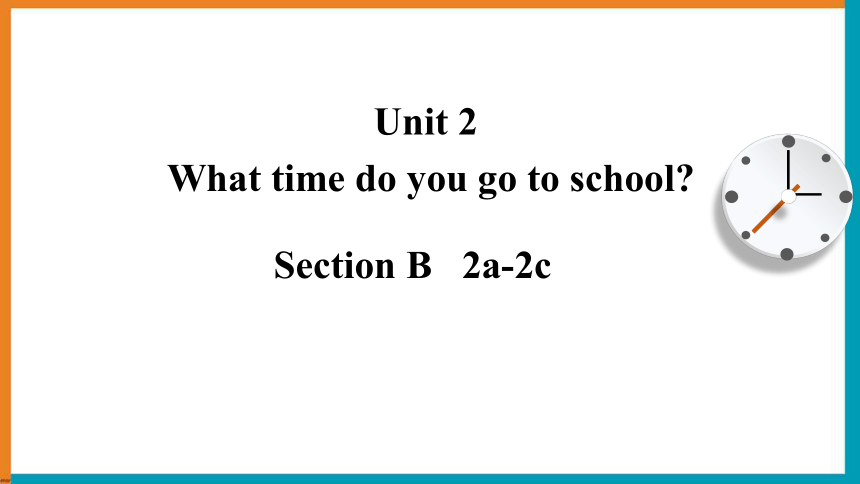
|
|
| 格式 | pptx | ||
| 文件大小 | 28.5MB | ||
| 资源类型 | 教案 | ||
| 版本资源 | 人教新目标(Go for it)版 | ||
| 科目 | 英语 | ||
| 更新时间 | 2024-02-03 00:00:00 | ||
图片预览

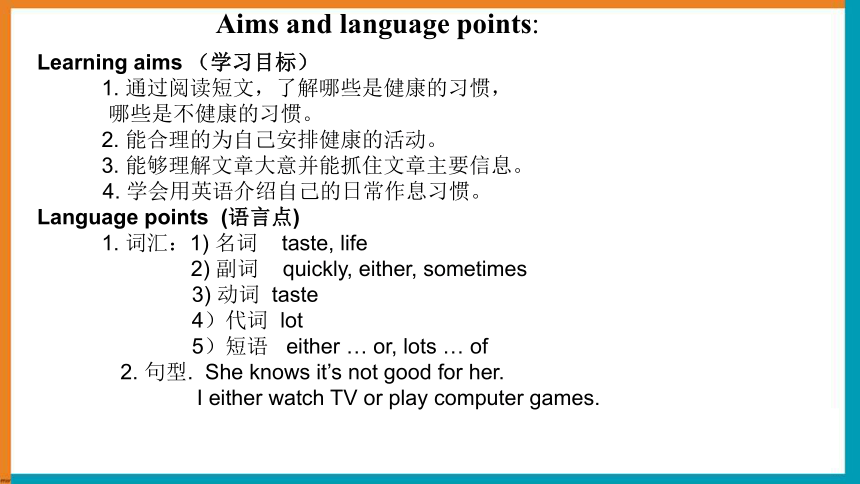
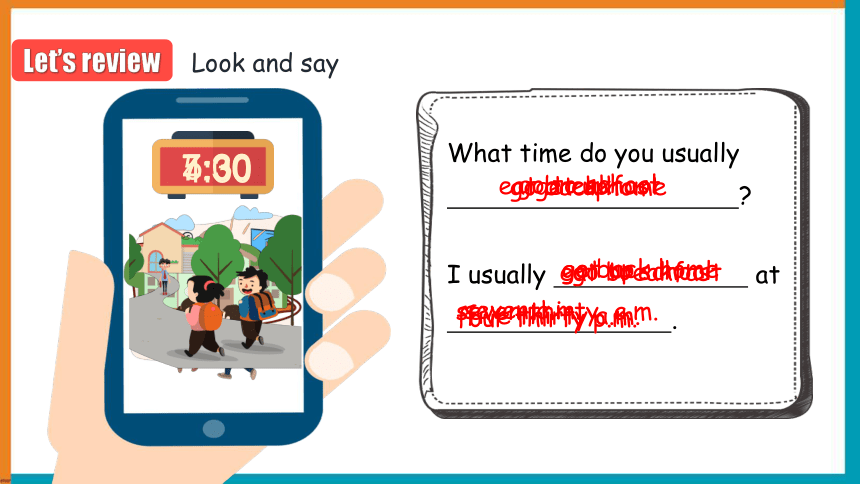

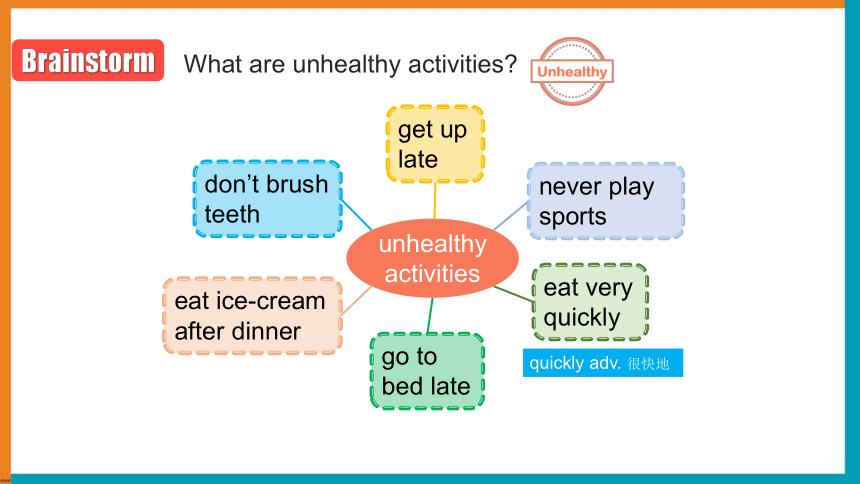
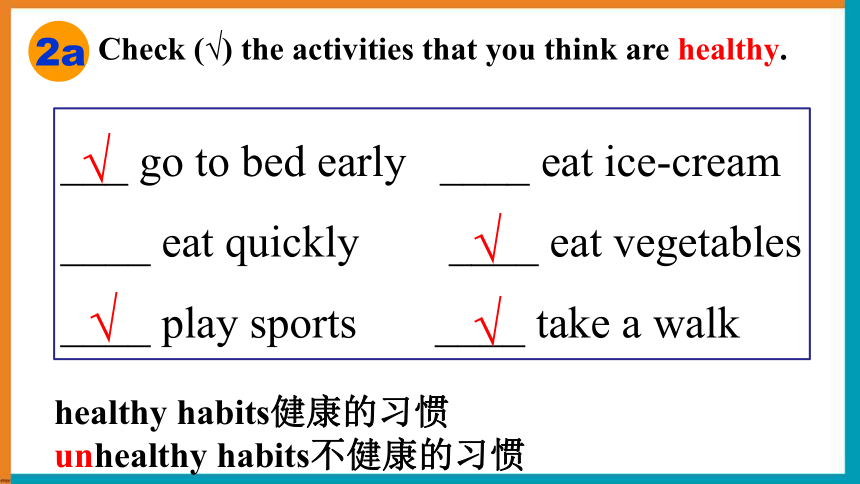
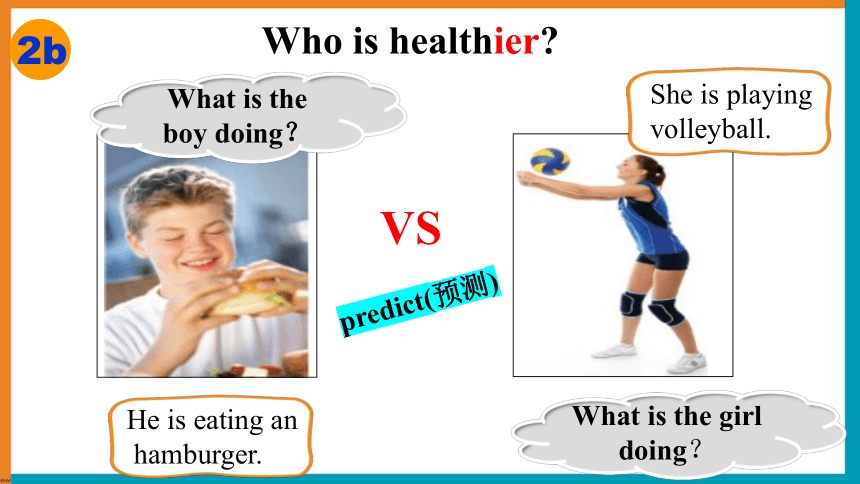
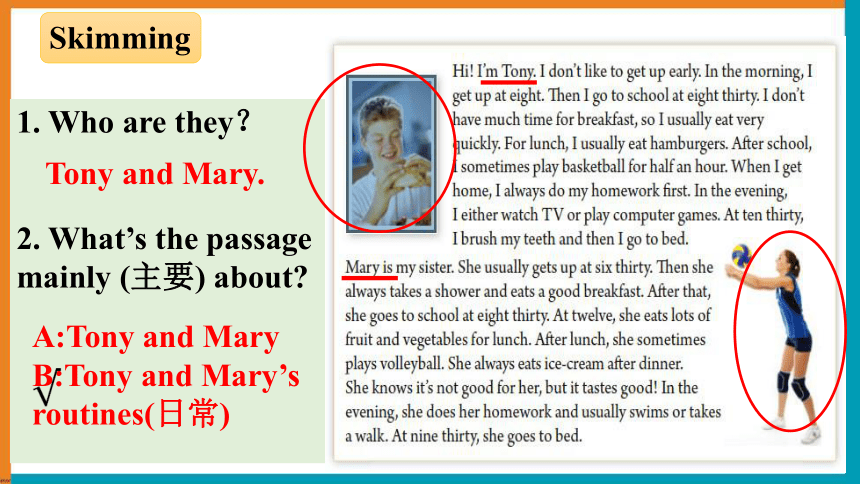
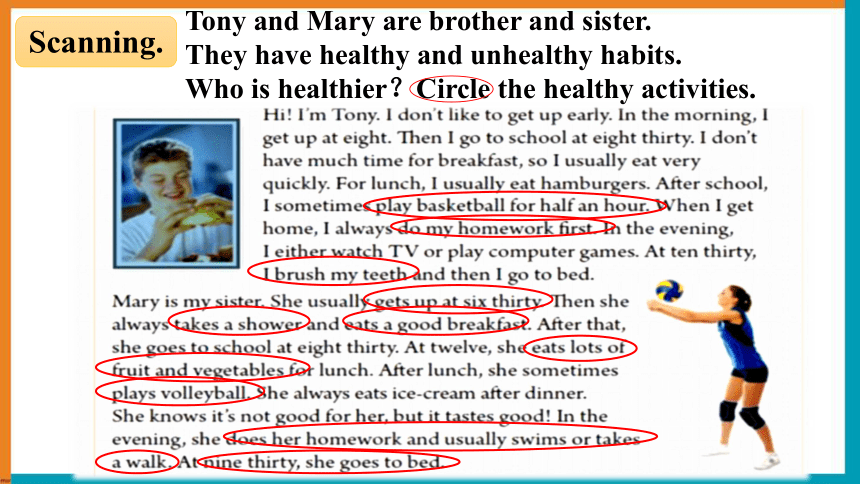
文档简介
(共27张PPT)
Unit 2
What time do you go to school
Section B 2a-2c
Aims and language points:
Learning aims (学习目标)
1. 通过阅读短文,了解哪些是健康的习惯,
哪些是不健康的习惯。
2. 能合理的为自己安排健康的活动。
3. 能够理解文章大意并能抓住文章主要信息。
4. 学会用英语介绍自己的日常作息习惯。
Language points (语言点)
1. 词汇:1) 名词 taste, life
2) 副词 quickly, either, sometimes
3) 动词 taste
4)代词 lot
5)短语 either … or, lots … of
2. 句型. She knows it’s not good for her.
I either watch TV or play computer games.
Let’s review
Look and say
What time do you usually
I usually at
.
get up
5:30
get up
five thirty a.m.
7:00
eat breakfast
eat breakfast
seven a.m.
7:30
go to school
go to school
seven thirty a.m.
4:30
go back home
go back home
four thirty p.m.
What are healthy activities
Brainstorm
healthy activities
get up early
go to bed early
run in the morning
take a walk after dinner
brush teeth after dinner
eat lots of vegetables and fruit
lots of 大量;许多
What are unhealthy activities
Brainstorm
unhealthy activities
get up late
go to bed late
don’t brush teeth
never play sports
eat ice-cream after dinner
eat very quickly
quickly adv. 很快地
Check (√) the activities that you think are healthy.
___ go to bed early ____ eat ice-cream
____ eat quickly ____ eat vegetables
____ play sports ____ take a walk
√
√
√
√
2a
healthy habits健康的习惯
unhealthy habits不健康的习惯
VS
Who is healthier
predict(预测)
2b
What is the boy doing?
What is the girl doing?
She is playing
volleyball.
He is eating an
hamburger.
1. Who are they?
2. What’s the passage mainly (主要) about
Tony and Mary.
A:Tony and Mary
B:Tony and Mary’s routines(日常)
Skimming
Scanning.
Tony and Mary are brother and sister.
They have healthy and unhealthy habits.
Who is healthier?Circle the healthy activities.
Underline the unhealthy activities.
Who is healthier
(更健康)
healthier
Let’s read
Listen and repeat
Hi! I’m Tony. I don’t like to get up early. In the morning, I get up at eight. Then I go to school at eight thirty. I don’t have much time for breakfast, so I usually eat very quickly. For lunch, I usually eat hamburgers. After school, I sometimes play basketball for half an hour. When I get home, I always do my homework first. In the evening, I either watch TV or play computer games. At ten thirty, I brush my teeth and then I go to bed.
so连接的并列句,前后两个分句之间是因果关系
半小时
达,计……,表示时间
要么……要么……; 或者……或者……
上床睡觉
Let’s read
Listen and repeat
Mary is my sister. She usually gets up at six thirty, Then she always takes a shower and eats a good breakfast. After that, she goes to school at eight thirty. At twelve, she eats lots of fruit and vegetables for lunch. After lunch, she sometimes plays volleyball. She always eats ice-cream after dinner. She knows it’s not good for her, but it tastes good! In the evening, she does her homework and usually swims or takes a walk. At nine thirty, she goes to bed.
=a lot of, 大量;许多 既可修饰可数名词复数(相当于many),又可修饰不可数名词(相当于much)。
作为;当作,表示目的
be good for 对……有好处 be bad for 对……有害
taste /te st/ v.有……的味道;品尝
Unhealthy habits Healthy activities
Tony 1. gets up at eight
2. eats hamburgers
3. eats very quickly
4. goes to bed late
Mary eats too much ice-cream
gets up early
2c
Write down the unhealthy habits of each person.
Then think of healthy activities for them.
eats fewer hamburgers
eats slowly
goes to bed early
eats a little ice-cream
Tony has many unhealthy habits. Can you make a healthier daily routine for him 你能为Tony设计一份更健康的日常生活作息时间表吗
In the morning, he gets up at sixty thirty.
...
Group work
In the evening, I either watch TV or play computer games.
either adv.副词 “或者;也(用在否定句末) ”
例:托尼也不会弹吉他。
Tony can’t play the guitar, either.
either …or …“要么…要么…;或者…或者…”,用来连接两个独立的词、短语,甚至独立的句子。
例:你可以吃苹果或者吃橙子。
You can eat either apples or oranges.
他不是在教室就是在图书馆。
He is either in the classroom or in the library.
例:他要么是不能来,要么是不想来。
Either he couldn’t come or he didn’t want to.
(词)
(短语)
(句子)
either …or …连接两个主语时,遵循“就近原则”,谓语动词与最近的主语保持一致。
例:明天要么你去那里,要么我去那里。
Either you or I am going there tomorrow.
after school 放学后
介词(prep.) for & after
for breakfast (在) 早餐
for lunch (在) 午餐
for half an hour (长达)半小时
与时间相关的介词短语,放于句首或句尾。
lot adv. 许多;很多
lots of = a lot of 大量;许多
many + 可数名词复数
much + 不可数名词
lots of /a lot of
+ 可数名词复数或不可数名词
一般用于否定句和疑问句中
常用于肯定句中
At twelve, she eats lots of fruit and vegetables for lunch.
She knows it’s not good for her, but it tastes good!
be good for … 对……有益/好处
be bad for … 对……有害/坏处
It’s good for your health to go to bed early and
get up early.
Don’t read in the dark. It’s bad for your eyes.
taste 吃/尝起来
smell 闻起来
feel 摸起来
look 看起来
sound 听起来
+ adj.
taste good
eat/sell well
系表结构(作谓语)
That sounds fun.
It looks nice.
This fish smells bad.
This sofa feels nice and soft.
一、按要求写出下列各词或词组。
too (同义词) ________
2. music (人物) ________
3. teach (人物) ________
4. teach (第三称单数形式 ) ________
5. busy (反义词) ________
6. on the weekend (同义词组) ___________
7. help sb. do sth. (同义词组)
__________________
also
musician
teacher
teaches
on weekends
help sb. with sth.
free
Exercises
二、根据汉语提示完成句子。
1. Are you __________ (擅长) children
2. I want ______ (join) the music club.
3. Mr. Lin is very busy ______________ (在周末).
4. They’re friendly. I want to ____________
(交朋友) with them.
good with
to join
on the weekend
make friends
5. Can you ____ ____ _____(帮我学习音乐) my music.
6. Please ____ Jane ___ (打电话给) 321-5497.
help me with
call at
7.Don't (run) across the street when the traffic lights are red or yellow.It's dangerous(危险的).
8.My grandfather keeps (health) by eating well and exercising regularly(规律地).
9.My parents are doctors and they saved(挽救) many
(life) during the outbreak of COVID-19.
10.My mother often (clean)our house on Sundays.
run
healthy
lives
cleans
单项选择。
1. Tony doesn't have healthy lifestyle, his brother doesn't have a
healthy lifestyle, _______.
A. too B. also C. either D.or
2. Doing exercise every day is good ______ your health.
A. for B. at C. with D. in
3. When can you get ______ Beijing
A. to B. up C. with D. in
4.This kind of fruit ______ good.
A. has B. sounds C. tastes D. have
C
A
A
C
Let’s
live a
healthy
life
!
eat fruits and vegetables
exercise
brush
teeth
twice
eat a good
breakfast
Unit 2
What time do you go to school
Section B 2a-2c
Aims and language points:
Learning aims (学习目标)
1. 通过阅读短文,了解哪些是健康的习惯,
哪些是不健康的习惯。
2. 能合理的为自己安排健康的活动。
3. 能够理解文章大意并能抓住文章主要信息。
4. 学会用英语介绍自己的日常作息习惯。
Language points (语言点)
1. 词汇:1) 名词 taste, life
2) 副词 quickly, either, sometimes
3) 动词 taste
4)代词 lot
5)短语 either … or, lots … of
2. 句型. She knows it’s not good for her.
I either watch TV or play computer games.
Let’s review
Look and say
What time do you usually
I usually at
.
get up
5:30
get up
five thirty a.m.
7:00
eat breakfast
eat breakfast
seven a.m.
7:30
go to school
go to school
seven thirty a.m.
4:30
go back home
go back home
four thirty p.m.
What are healthy activities
Brainstorm
healthy activities
get up early
go to bed early
run in the morning
take a walk after dinner
brush teeth after dinner
eat lots of vegetables and fruit
lots of 大量;许多
What are unhealthy activities
Brainstorm
unhealthy activities
get up late
go to bed late
don’t brush teeth
never play sports
eat ice-cream after dinner
eat very quickly
quickly adv. 很快地
Check (√) the activities that you think are healthy.
___ go to bed early ____ eat ice-cream
____ eat quickly ____ eat vegetables
____ play sports ____ take a walk
√
√
√
√
2a
healthy habits健康的习惯
unhealthy habits不健康的习惯
VS
Who is healthier
predict(预测)
2b
What is the boy doing?
What is the girl doing?
She is playing
volleyball.
He is eating an
hamburger.
1. Who are they?
2. What’s the passage mainly (主要) about
Tony and Mary.
A:Tony and Mary
B:Tony and Mary’s routines(日常)
Skimming
Scanning.
Tony and Mary are brother and sister.
They have healthy and unhealthy habits.
Who is healthier?Circle the healthy activities.
Underline the unhealthy activities.
Who is healthier
(更健康)
healthier
Let’s read
Listen and repeat
Hi! I’m Tony. I don’t like to get up early. In the morning, I get up at eight. Then I go to school at eight thirty. I don’t have much time for breakfast, so I usually eat very quickly. For lunch, I usually eat hamburgers. After school, I sometimes play basketball for half an hour. When I get home, I always do my homework first. In the evening, I either watch TV or play computer games. At ten thirty, I brush my teeth and then I go to bed.
so连接的并列句,前后两个分句之间是因果关系
半小时
达,计……,表示时间
要么……要么……; 或者……或者……
上床睡觉
Let’s read
Listen and repeat
Mary is my sister. She usually gets up at six thirty, Then she always takes a shower and eats a good breakfast. After that, she goes to school at eight thirty. At twelve, she eats lots of fruit and vegetables for lunch. After lunch, she sometimes plays volleyball. She always eats ice-cream after dinner. She knows it’s not good for her, but it tastes good! In the evening, she does her homework and usually swims or takes a walk. At nine thirty, she goes to bed.
=a lot of, 大量;许多 既可修饰可数名词复数(相当于many),又可修饰不可数名词(相当于much)。
作为;当作,表示目的
be good for 对……有好处 be bad for 对……有害
taste /te st/ v.有……的味道;品尝
Unhealthy habits Healthy activities
Tony 1. gets up at eight
2. eats hamburgers
3. eats very quickly
4. goes to bed late
Mary eats too much ice-cream
gets up early
2c
Write down the unhealthy habits of each person.
Then think of healthy activities for them.
eats fewer hamburgers
eats slowly
goes to bed early
eats a little ice-cream
Tony has many unhealthy habits. Can you make a healthier daily routine for him 你能为Tony设计一份更健康的日常生活作息时间表吗
In the morning, he gets up at sixty thirty.
...
Group work
In the evening, I either watch TV or play computer games.
either adv.副词 “或者;也(用在否定句末) ”
例:托尼也不会弹吉他。
Tony can’t play the guitar, either.
either …or …“要么…要么…;或者…或者…”,用来连接两个独立的词、短语,甚至独立的句子。
例:你可以吃苹果或者吃橙子。
You can eat either apples or oranges.
他不是在教室就是在图书馆。
He is either in the classroom or in the library.
例:他要么是不能来,要么是不想来。
Either he couldn’t come or he didn’t want to.
(词)
(短语)
(句子)
either …or …连接两个主语时,遵循“就近原则”,谓语动词与最近的主语保持一致。
例:明天要么你去那里,要么我去那里。
Either you or I am going there tomorrow.
after school 放学后
介词(prep.) for & after
for breakfast (在) 早餐
for lunch (在) 午餐
for half an hour (长达)半小时
与时间相关的介词短语,放于句首或句尾。
lot adv. 许多;很多
lots of = a lot of 大量;许多
many + 可数名词复数
much + 不可数名词
lots of /a lot of
+ 可数名词复数或不可数名词
一般用于否定句和疑问句中
常用于肯定句中
At twelve, she eats lots of fruit and vegetables for lunch.
She knows it’s not good for her, but it tastes good!
be good for … 对……有益/好处
be bad for … 对……有害/坏处
It’s good for your health to go to bed early and
get up early.
Don’t read in the dark. It’s bad for your eyes.
taste 吃/尝起来
smell 闻起来
feel 摸起来
look 看起来
sound 听起来
+ adj.
taste good
eat/sell well
系表结构(作谓语)
That sounds fun.
It looks nice.
This fish smells bad.
This sofa feels nice and soft.
一、按要求写出下列各词或词组。
too (同义词) ________
2. music (人物) ________
3. teach (人物) ________
4. teach (第三称单数形式 ) ________
5. busy (反义词) ________
6. on the weekend (同义词组) ___________
7. help sb. do sth. (同义词组)
__________________
also
musician
teacher
teaches
on weekends
help sb. with sth.
free
Exercises
二、根据汉语提示完成句子。
1. Are you __________ (擅长) children
2. I want ______ (join) the music club.
3. Mr. Lin is very busy ______________ (在周末).
4. They’re friendly. I want to ____________
(交朋友) with them.
good with
to join
on the weekend
make friends
5. Can you ____ ____ _____(帮我学习音乐) my music.
6. Please ____ Jane ___ (打电话给) 321-5497.
help me with
call at
7.Don't (run) across the street when the traffic lights are red or yellow.It's dangerous(危险的).
8.My grandfather keeps (health) by eating well and exercising regularly(规律地).
9.My parents are doctors and they saved(挽救) many
(life) during the outbreak of COVID-19.
10.My mother often (clean)our house on Sundays.
run
healthy
lives
cleans
单项选择。
1. Tony doesn't have healthy lifestyle, his brother doesn't have a
healthy lifestyle, _______.
A. too B. also C. either D.or
2. Doing exercise every day is good ______ your health.
A. for B. at C. with D. in
3. When can you get ______ Beijing
A. to B. up C. with D. in
4.This kind of fruit ______ good.
A. has B. sounds C. tastes D. have
C
A
A
C
Let’s
live a
healthy
life
!
eat fruits and vegetables
exercise
brush
teeth
twice
eat a good
breakfast
同课章节目录
- Unit 1 Can you play the guitar?
- Section A
- Section B
- Unit 2 What time do you go to school?
- Section A
- Section B
- Unit 3 How do you get to school?
- Section A
- Section B
- Unit 4 Don't eat in class.
- Section A
- Section B
- Unit 5 Why do you like pandas?
- Section A
- Section B
- Unit 6 I'm watching TV.
- Section A
- Section B
- Review of Units 1-6
- Unit 7 It's raining!
- Section A
- Section B
- Unit 8 Is there a post office near here?
- Section A
- Section B
- Unit 9 What does he look like?
- Section A
- Section B
- Unit 10 I'd like some noodles.
- Section A
- Section B
- Unit 11 How was your school trip?
- Section A
- Section B
- Unit 12 What did you do last weekend?
- Section A
- Section B
